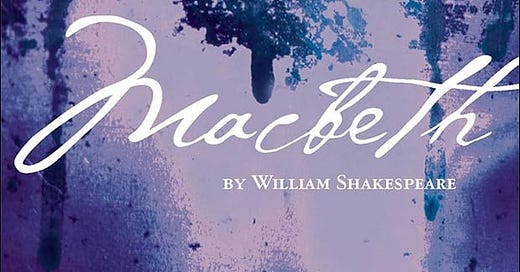If you are looking for the beginning of the study for Shakespeare’s Macbeth then you can go HERE for a brief introduction. At the bottom of the introduction you will find the links to each section of the study guide as it becomes available. If you would like to see the growing list of book studies available for free on this site you can go HERE. Enjoy!
Virtues/Vices/Great Ideas: (Find them in the Text)
Fate vs. Fortune, Prophecy, Prudence
Grammar Questions: (The Information of the Text)
When did the three witches say they would be together again and with whom would they meet?
How did Macbeth kill the traitor Macdonwald?
Whom had Macdonwald traitorously supported against King Duncan of Scotland?
What did King Duncan proclaim should be done with the Thane of Cawdor’s title?
What did the first witch do because the sailor’s wife would not give up her chestnuts?
What made Macbeth hesitant to refer to the weird sisters as women?
What prophecy did the witches make concerning Macbeth?
What prophecy did the witches make concerning Banquo?
What message did Ross and Angus deliver to Macbeth?
What were Macbeth and Banquo’s general reactions to the news that was brought them?
Logic Questions: (Interpreting, Comparing/Contrasting, Reasoning)
What does the statement, “Fair is foul, and foul is fair” mean?
What does it mean to call someone, “valour’s minion?”
What do we learn about the nature and character of the Weird sisters from the episode concerning the Sailor and his wife?
Compare Macbeth’s opening line with the first line that the Weird Sisters said in unison. What might we infer from this comparison?
An important theme in Macbeth is the inversion of expectation in general and the inversion/confusion of the sexes (and the roles that are thought to accompany them) in particular. How can we see the beginning of this confusion in the text so far?
Banquo, after hearing that part of the witches prophecy had come true, said, “Can the devil speak true?” Why might this be an important question in the play?
What is meant by Macbeth’s statement, “Present fears are less than horrible imaginings?”
What is meant by Macbeth’s statement, “If chance will have me king, why, chance may crown me without my stir?”
Rhetoric Questions: (The Analysis of Ideas in the Text)
When it comes to placing confidence in someone’s claims, how much weight should be given to their personal character (virtue)? Since evil people are capable of saying true things, what principles should we follow when determining whether or not we ought to believe them? Explain your answer with good reasoning.
Theological Analysis: (Sola Scriptura)
Read Luke 4:1-13. How does this relate to our current reading? Does this reading impact your thinking on the Rhetoric question? If so, explain how.



